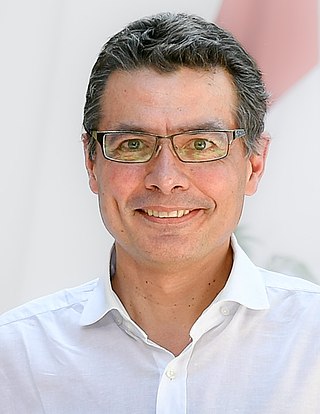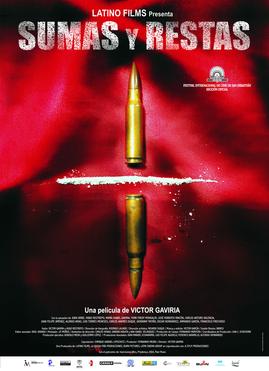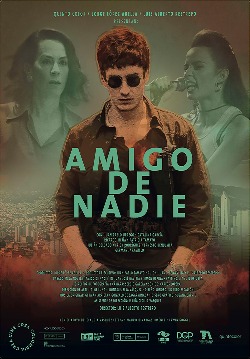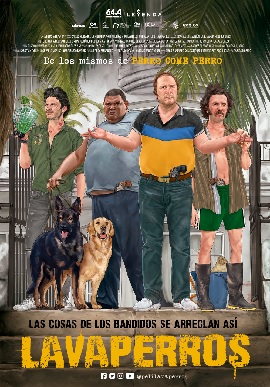
Pablo Emilio Escobar Gaviria was a Colombian drug lord, narcoterrorist, and politician who was the founder and sole leader of the Medellín Cartel. Dubbed "the king of cocaine", Escobar is considered the wealthiest criminal in history, having amassed an estimated net worth of US$30 billion by the time of his death—equivalent to $70 billion as of 2022—while his drug cartel monopolized the cocaine trade into the United States in the 1980s and early 1990s.

Cinema of Colombia refers to film productions made in Colombia, or considered Colombian for other reasons. Colombian cinema, like any national cinema, is a historical process with industrial and artistic aspects.

Víctor Manuel Gaviria González is a Colombian film director, writer, and poet. His four feature-length films are acclaimed and have won many international awards. He is the first Colombian filmmaker to be featured at the Cannes Film Festival. He is often recognized as Colombia's most influential and well-known filmmaker.

El Espectador is a newspaper of national circulation within Colombia, founded by Fidel Cano Gutiérrez on March 22, 1887, in Medellín and published since 1915 in Bogotá. It transition from a daily to a weekly edition in 2001, following a financial crisis, and again with a daily released since May 11, 2008, a comeback which had been long rumoured, in tabloid format. From 1997 to 2011 its main shareholder was Julio Mario Santo Domingo.

Carlos Emilio Gaviria Díaz was a Colombian lawyer, professor and politician. He served as the 5th Chief Magistrate of the Constitutional Court of Colombia, where he served as a Magistrate from 1993 to 2001. After retiring from the Court, he went into politics becoming a Senator of Colombia in 2002, and running for President as an Alternative Democratic Pole candidate in the 2006 presidential election, ultimately losing to ex-president Álvaro Uribe Vélez, who was seeking his second term in office.

Humberto de la Calle Lombana is a Colombian lawyer and politician. He served as Vice President of Colombia from 1994 to 1997. De La Calle served in the cabinet as Interior Minister under two Presidents, Andrés Pastrana and César Gaviria. He also served as Ambassador to Spain and the United Kingdom. After 2003, De La Calle worked at his own Law firm which specialises in advising and representing international clients in Colombia. In October 2012 he was appointed by President Juan Manuel Santos as the chief negotiator in the peace process with the FARC.
Gustavo de Greiff Restrepo was a Colombian lawyer, educator and activist, who served as Attorney General of Colombia during the Gaviria presidency and later as Ambassador to Mexico during the Samper presidency. He was an outspoken critic of the United States' War on Drugs in Colombia, and an advocate for drug liberalization policies.
Carlos Eduardo Medellín Becerra is a Colombian lawyer and diplomat and has served as Minister of Justice of Colombia and as Ambassador of Colombia to the United Kingdom.

Alejandro Gaviria Uribe is a Colombian economist and engineer, serving as the Minister of National Education of Colombia since 7 August 2022, replacing María Victoria Angulo. He also served as Minister of Health and Social Protection of Colombia from 2012 to 2018. He is the former Rector of the University of Los Andes (Colombia), where he served from 2019 to August 2021. He was Dean of the School of Economics at University of los Andes in 2006, until his appointment as Minister in 2012. Prior to his academic career, Gaviria served as Deputy Director of the National Planning Department of Colombia, as well as Deputy Director of the Foundation for the Higher Education and Development (Fedesarrollo), a private non-profit policy research centre, and as a Researcher at the Inter-American Development Bank. A published author of several books and scientific articles in peer-reviewed journals, in 2019 he was appointed Rector of University of the Andes for a four-year period.
Ricardo Sala Gaitán is a Colombian industrial engineer and politician.

Sumas y Restas is a 2004 Colombian drama film directed and co-written by Víctor Gaviria. The plot follows a young real estate developer who ventures into cocaine trafficking lured by the opportunity of making quick money, but his life descends in a spiral of drugs and violence. As he did in his previous films, Víctor Gaviria opted to cast non-professional actors.

Julieth Restrepo is a Colombian model and actress.
Colombia magia salvaje is a Colombian documentary film released in 2015, directed by Mike Slee and produced for Éxito Group, by the Ecoplanet Foundation and the British firm Off The Fence. The film is a sample of the biodiversity of Colombia, recorded in 85 different locations to achieve the portrait of 20 ecosystems.

Amigo de nadie is a 2019 Colombian drama film directed by Luis Alberto Restrepo based on the 2012 book titled Para matar a un amigo by Juan José Gaviria and Simón Ospina. The film premiered on 7 November 2019 in Colombia, and it stars Juan Pablo Urrego as the titular character.
The Ariel Award for Best Ibero-American film is a film award category created in 2000, part of the Ariel Awards, which are presented by the Academia Mexicana de Artes y Ciencias Cinematográficas (AMACC).

Fabio Iván Restrepo was a Colombian actor, known mainly for playing Gerardo in the film Sumas y restas by Víctor Gaviria and for his extensive career in film and television in Colombia.

The shape of things to come is a 2021 internationally co-produced science fiction drama film directed by Victor Checa and written by Víctor Checa and Victor Huizar. It stars Fernando Bacilio and Lorenzo Molina.

Dogwashers is a 2020 Colombian-Argentine crime black comedy-drama film directed by Carlos Moreno and written Pilar Quintana & Antonio García. Starring Christian Tappan accompanied by Anderson Ballesteros, Jhon Álex Toro, Ulises González, Leonor López, Héctor Mauricio Mejía and Johnnie Castillo.












